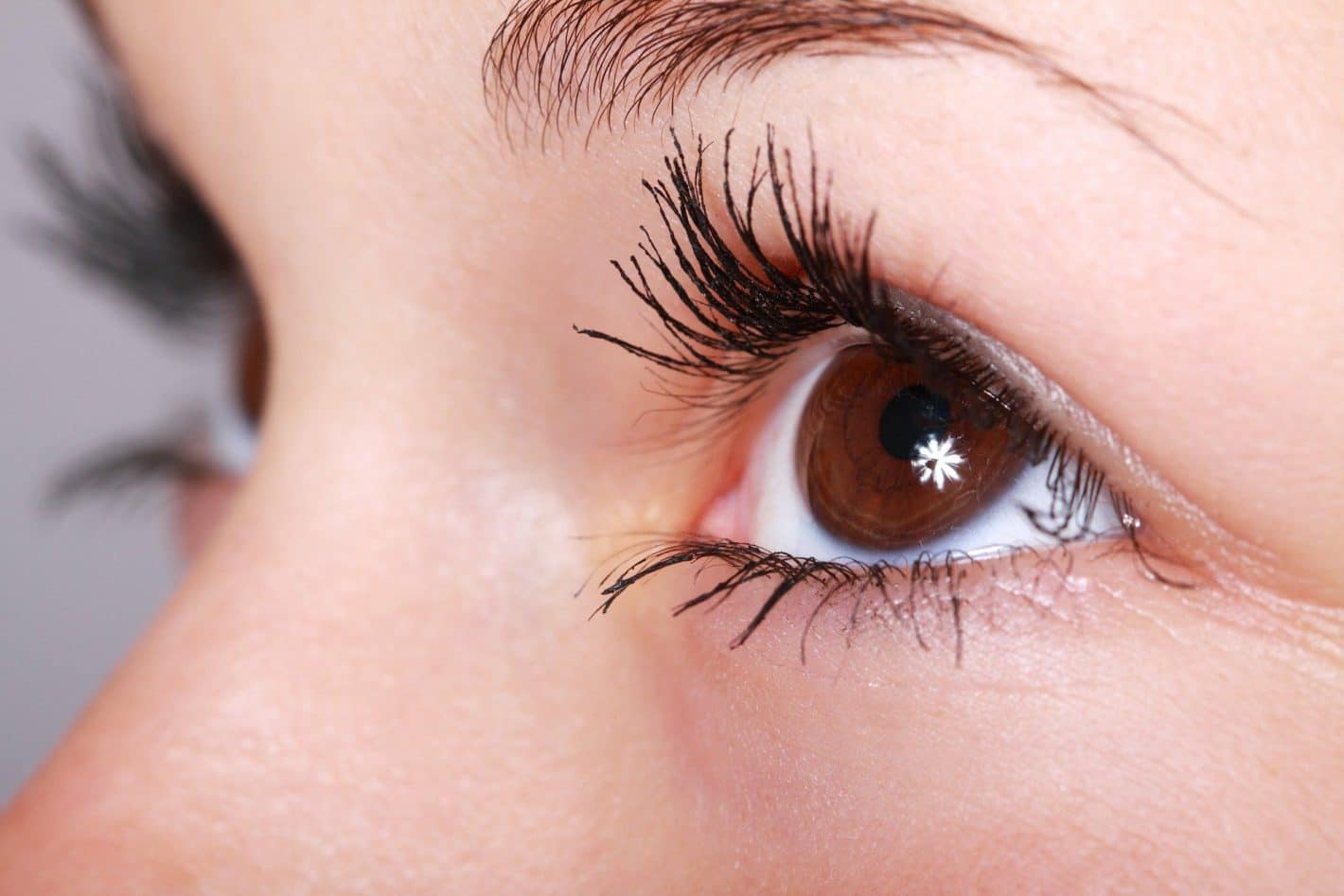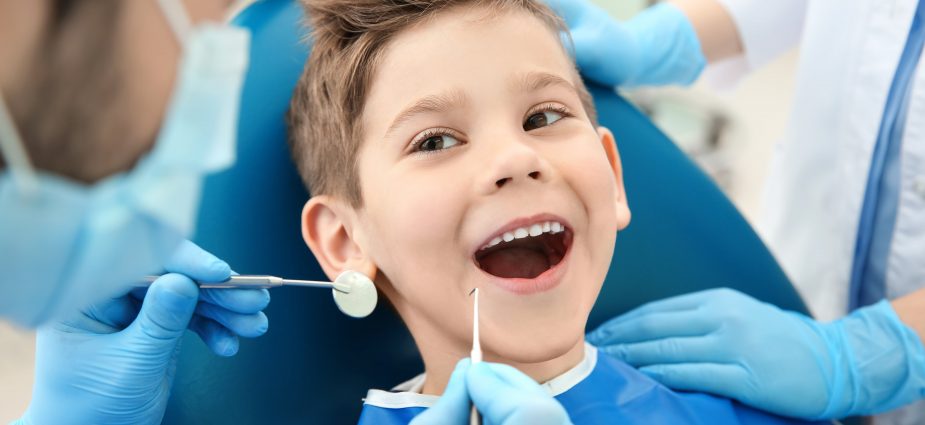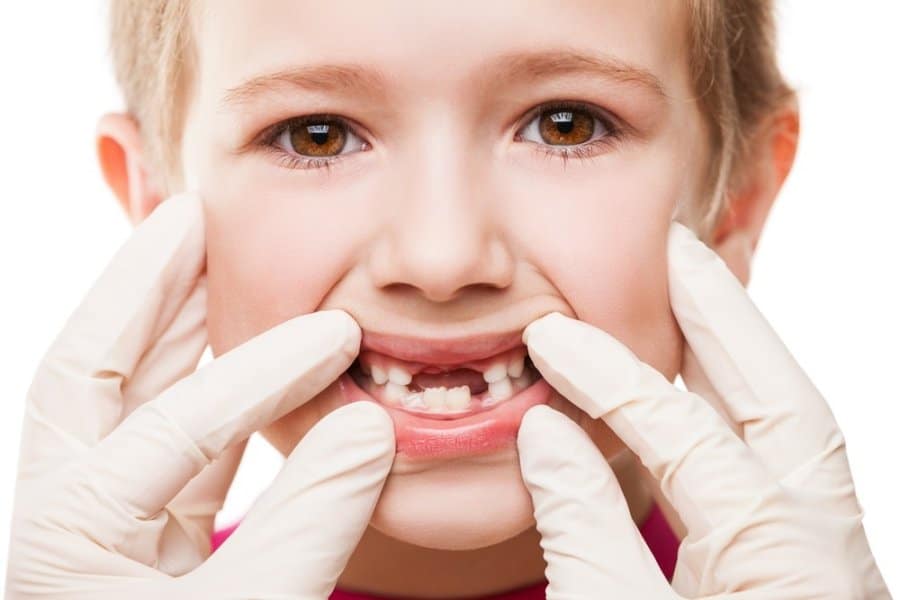Tooth decay, also popularly called cavities or caries, is one of the most common childhood disease. Tooth decay is preventable and treatable.
Dr Pratibha Kukreja Pandit (MDS, Paediatric and Preventive Dentist) interacts with parents every day and addresses issues such as cavities and tooth decay. In this blog, Dr Pratibha, as an expert dentist for kids, will be discussing oral health habits, what is tooth decay and how to prevent it easily through better oral care habits.
Raising a kid is a full-time responsibility. Parents have to take care of the child’s schooling, physical and mental health as they grow up. Children’s oral health management and care is a major concern for parents with young kids. Parents often ask a dentist for kids about the steps they can take to maintain their child’s oral hygiene, especially the prevention of tooth decay. This blog answers all the tooth decay related queries and certainly simplifies oral care for kids.
What Is Tooth Decay?
First of all, let us understand what tooth decay is and why is it important for you, as a parent to watch out for any signs of tooth decay in your kid’s teeth.
Tooth decay, also popularly called cavities or caries, is one of the most common childhood disease. Tooth decay is the damage that occurs to the tooth when bacteria in the mouth create acids that eat away at the enamel of the tooth. As enamel is the protective outer layer of the teeth, once the protective layer is attacked, the teeth begin to suffer damage.
When residual food particles are left on teeth, they combine with saliva and bacteria that live in the mouth to form a sticky substance called plaque. The enamel can get damaged because of plaque, causing the tooth to rot and create a hole or cavity on its surface. Hence, it is important to prevent tooth decay from the very beginning.
Why Are My Child's Teeth Decaying?
High intake of sugary foods or a callous attitude towards dental hygiene is a leading cause of why children’s teeth begin decaying.
Parental supervision is necessary over the food and oral care habits of children to prevent tooth decay.
What Causes Tooth Decay In Kids?
Dental decay is a multifactorial disease. Depending on the age group of the child, the causes of tooth decay can vary slightly. Since the eating and feeding habits of young children evolve quickly as they go from infants to toddlers to young kids.
Furthermore, pediatric dentists have also classified the stages of tooth decay to help them in efficient and effective dental treatments.
For Babies
At Pandit Clinic’s Paediatric Dentistry Practice in Pune, we inform parents of infants that one of the reasons for tooth decay is due to the sharing of spoons between the parents’ and the baby. If the same spoon is shared with the child, the bacteria present in the saliva gets passed on as well, making the baby subject to the risk of tooth decay.
One of the most significant cause of tooth decay in infants and toddlers is putting them to sleep with a bottle of milk in their mouth. Cavities start to form when food or other liquids (including breast milk or formula milk) stay in your baby’s mouth for longer periods. Bacteria convert the sugars present in food particles and milk to acid, which damages the teeth and gums. And when this happens more often, it causes the teeth to decay.
Young Kids
In young kids, the diet plays a big role in whether or not they are susceptible to tooth decay. If your child’s diet contains high amounts of refined carbohydrates or sugary/sticky foodstuffs, then he/she is more prone to tooth decay. This is because these foods tend to stick on tooth surfaces. The frequent usage of sipper cups or bottles of milk, sweetened drinks, juice or sodas can lead to tooth decay. In foodstuffs, overconsumption of chocolates, candy, cake, laddoos, sugary cereals, and bread will cause tooth decay.
Fluoride deficiency can also cause tooth decay. Fluoride is a naturally occurring mineral which boosts the teeth enamel, thus strengthening the protective layer of the teeth. Inadequate amount of Fluoride in the tooth structure can cause teeth to decay prematurely.
One of the most underrated but important reasons for tooth decay in young kids is poor brushing and oral care habits. Kids with bad or zero dental care habits tend to suffer from tooth decay more than kids with good oral care habits.
What Are The Signs of Tooth Decay?
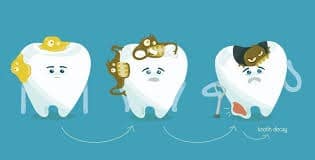
If you notice a band of white on your child’s teeth, especially near the gum line, this is decay in its initial stage (precavitation) . If left untreated it may further develop brown spots on the teeth and gums might look swollen and red. As the damage advances, you may find blackened holes in your child’s teeth.
Your child may suffer from a toothache as the decay begins to progress. He/she may also experience heightened sensitivity to hot and cold foods/liquids.
As a dentist for kids, I advise parents to bring in their child immediately if they show any of the above symptoms. It is essential that they begin dental treatment at the earliest to stop the spread of tooth decay.
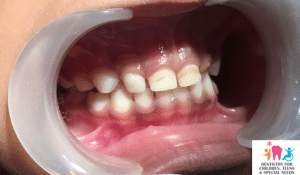
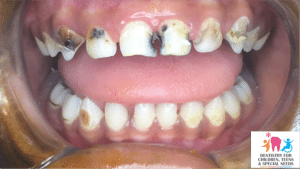
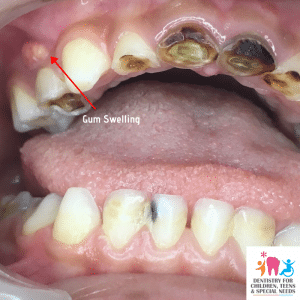
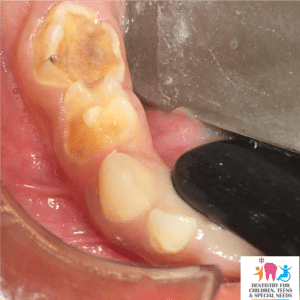
What Oral Care Habits Can Prevent Tooth Decay?
Even though tooth decay is a common dental problem in children it is preventable at most times. As a kids dentist, we often come across parents asking for tips on good oral care. Following are our tips for solid oral health management and prevention of tooth decay:
For Babies
Gum Care: Start taking care of your baby’s gums even before the process of teething begins. Use a soft piece of cloth to wipe clean the gums. This will keep the mouth free from bacteria and will also help the child to get accustomed to the oral care routine later. Using a damp washcloth on gums also helps to soothe sore gums during teething.
Avoid Spoon Sharing: Remember to not share your spoon with the baby. This will prevent the passing of any bacteria from your saliva into your child’s mouth. Saliva contains bacteria that can spread and cause harm to your kid’s oral health.
No Milk Bottle In Bed: Do not get your baby accustomed to a milk bottle in bed once the teeth begin to erupt. Longer exposure to sugar (even natural sugar) will erode the teeth enamel faster. Hence, avoid giving the baby a milk bottle when they are ready for bed.
Don’t Let The Milk Bottle Become A Pacifier: If your baby begins using the milk bottle as a pacifier, stop him/her immediately. This is not a healthy habit and will lead to tooth decay.
For Young Kids
Brushing Twice A Day: The most vital habit to prevent tooth decay is regularly brushing teeth. Teach your child to brush twice a day, every day. Properly brushed teeth will not allow the bacteria to grow and attack the teeth. Also, no food residue will be left in the kid’s mouth if they brush twice every day.
No Food In Bed: The rule of not giving a milk bottle to a baby should continue as the baby turns into a young kid. Ensure that you do not allow your child to eat/drink anything in bed, or just before they go to sleep. There is a high possibility that the residue of the food will damage his/her teeth when the kid falls asleep.
The Right Diet: Limit the number of sweets that your kid snacks on. It includes candies, chocolates, biscuits, cookies and even fruit juice or other sweetened drinks. Avoid these especially during the times in between meals. As a parent, inculcate the habit of eating healthy in your child from a very young age.
Dental Check-Up: It is vital for a child to visit a dentist for kids at least twice a year for routine check-ups. Paediatric Dentists perform a thorough examination of the child’s teeth during check-ups. They can spot any developmental issues early on if the child visits the dentist regularly.
Prevention Is Better Than Cure!
The mantra of prevention is better than cure is especially true when it comes to tooth decay. My advise to parents of young children to make oral health care fun for kids! I tell parents to impart good dental care habits in their children because this will set them up for a healthier and happier life.
We hope you enjoyed reading this blog. Please feel free to reach out to us at on +91 88059 80048 or panditclinicindia@gmail.com if you have any further queries – Dr Pratibha will be happy to help you out!
Cavity Prevention Treatments
You Might Be Interested In
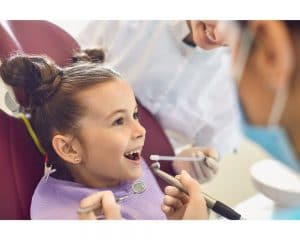
Dental Fillings For Children
Why Do Children Need Dental Fillings? Dental fillings are restorations placed in the tooth to repair damage caused by decay. They can be made from
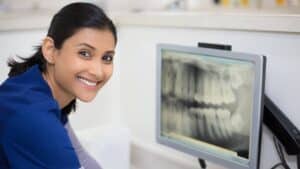
Dental X-Rays: A Parent’s Essential Guide for Kids
Hey there, parents! We’ve all been there – the moment when your little one gives you a cheeky grin, revealing a set of tiny teeth
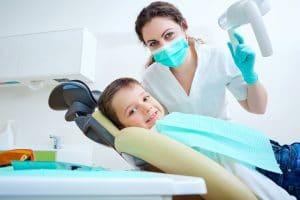
Pediatric Dental Treatments Under General Anaesthesia
Call us +91 7888229284 Home Pediatric Dentistry Paediatric Dental Treatments Under General Anaesthesia Pandit Clinic, Pune’s best Paediatric Dentistry practice led by Dr Pratibha Kukreja

Orthodontics
Call us +91 7888229284 Home Pediatric Dentistry Orthodontics Orthodontic treatments help to prevent and correct misaligned teeth, crooked teeth, bite irregularites and other such issues




